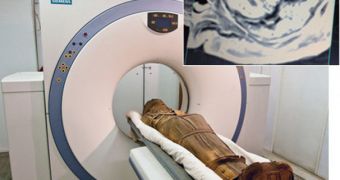Pharaohs and their priests were praised in Ancient Egypt as something close to gods. Their status was highly privileged, and they benefited from all spoils that their lands could produce, while others were starving and dying. But it would seem that, in spite of having the best possible conditions to live as long as possible, the pharaohs' hearts were all too human. Egyptologists and cardiologists discovered traces of ancient heart diseases in mummies dating as far back as 1530 BCE, more than 3,500 years ago. And the condition seemed to be fairly widespread too, ScienceNow reports.
Cairo University Egyptology Professor Abdel Nureldin says that many mummies were found to be suffering from heart conditions. The ancient Egyptians ate mostly salted fish, cheese and bread. The richer classes, including the pharaohs, their entourages, their priests and guards, also consumed goat, cow and sheep meat, alongside butter, cakes and honey. In spite of this fat-rich diet, the people of ancient times did not gain too much weight, mostly because they led an active life that prevented them from growing bellies and excess fat layers.
However, in nine of the 16 analyzed mummies, which were placed inside CT scan machines, the investigators found a buildup of calcium gunk, which is a classic indicator of heart diseases. Of these nine mummies, four were of women and five of men, hinting at the fact that both genders were affected by it. Also, the mummies spanned a time frame of about 1,900 years, which means that heart issues were not common throughout some of Egypt's most important dynasties and rules. The researchers steered clear of concluding that the mummies' cause of death was heart failure or a similar condition, but said that the diseases might have had an impact on their sufferers' quality of life.
The CU team reported its findings today, at the annual meeting of the American Heart Association, held in Orlando, Florida. Details of the investigation were also published in the November 18 issue of The Journal of the American Medical Association. “I would have thought that atherosclerosis was a disease of modern man, not something that affected people in the time of Moses,” Samuel Wann, a cardiologist at the Wisconsin Heart Hospital in Milwaukee, and also a coauthor of the new paper, says. “It throws out a lot of old myths about how we're going to pot because of our modern lifestyle,” Carnegie Museum of Natural History curator of anthropology Sandra Olsen concludes.

 14 DAY TRIAL //
14 DAY TRIAL //